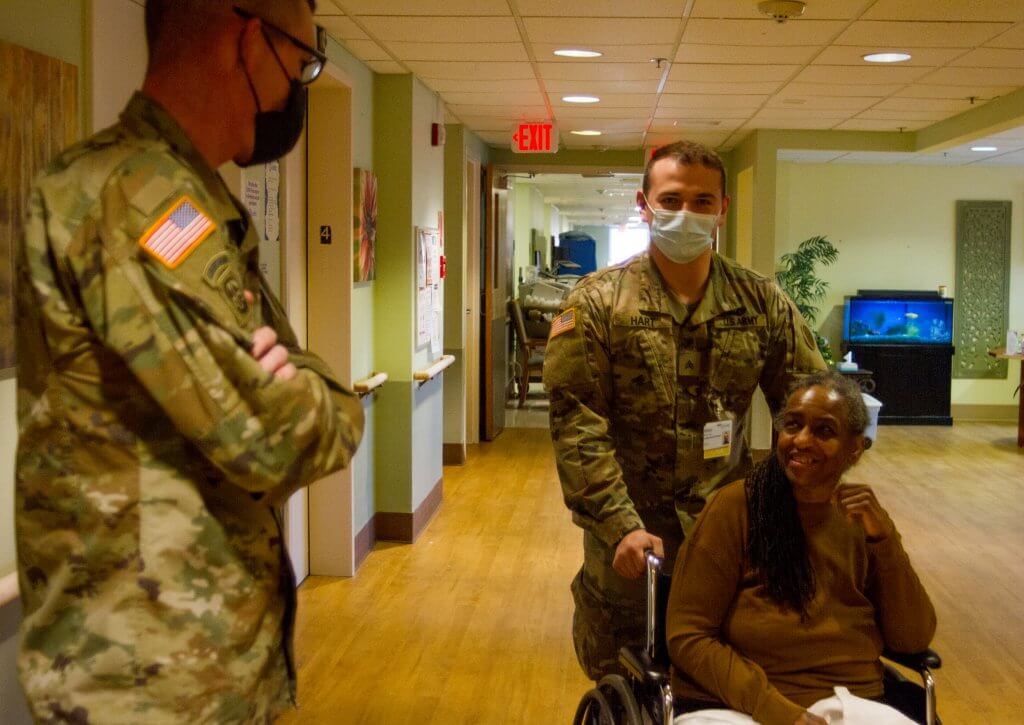National Guardsmen deployed to mitigate the spread of COVID-19 amid the omicron surge who have direct contact with the public are required to be fully vaccinated against the virus, according to leaders on a media roundtable.
Army Gen. Daniel Hokanson, chief of the National Guard Bureau, said during the Thursday morning call that more than 15,200 Guard members across 49 states and territories are contributing to efforts to mitigate the spread of COVID-19.
Ohio currently has the highest number of Guard members supporting the COVID-19 mission across all states and territories, Hokanson said.
Nearly 2,500 Ohio guardsmen are currently activated, with almost 2,300 deployed to hospitals, according to Army Maj. Gen. John C. Harris Jr., adjutant general of the Ohio National Guard.
“[Our] primary function is to ensure that we help hospitals meet capacity as they’re being overrun by the perfect storm,” Harris said, citing the combination of delta and omicron variants of the novel coronavirus.
The Guard, according to Harris, deployed medical and nonmedical teams to help area hospitals expand their capacity and assist in running testing sites.
“Medical teams are working side by side with clinical staff,” Harris said.
Nonmedical teams are providing environmental services, patient transport and conducting general administrative tasks, according to Harris.
Meanwhile, testing, according to Harris, is “probably one of the greatest ways” the Guard has helped the medical community extend its capacity. Some sites, he said, “are running over 1,000 people a day.”
Master Sgt. Bob Stephens said the testing facility that opened Jan. 3, in cooperation with Ohio State University, started out testing 291 people. As of Wednesday, it had administered 1,018 in eight hours.
“So numbers are going up. People testing is going up. And it’s all by appointment only at this certain facility,” Stephens said. “So that many people with appointments, it’s pretty serious.”
Harris said that his guardsmen who interact with patients and work at testing facilities must be fully vaccinated against COVID-19. While some partially vaccinated guardsmen are on COVID-19 missions, they do not have direct contact with the public.
In New York, nearly 1,600 soldiers and airmen are supporting COVID-19 operations, according to Army Brig. Gen. Isabel Rivera Smith, director of joint staff of the New
York National Guard. At its height, the New York National Guard had 3,600 service members on duty.
In December, the Guard was asked to train up to 400 members as emergency-certified medical technicians. The first class began Jan. 5, and those guardsmen are expected to be certified “as early as February,” Smith said. Their certification will be valid for three years.
Nine more classes are planned statewide starting this month and continuing into February, she said.
Soldiers and airmen who aren’t fully vaccinated are not on the COVID-19 mission, according to Smith. She said about 99% of the state’s Air National Guard is fully vaccinated, compared to roughly 83% of the Army National Guard, which has a June 30 vaccination deadline.
Air Force Col. Michael J. Bruno, chief of the joint staff for Joint Force Headquarters of the Colorado National Guard, said his guardsmen have been involved in operations, planning and logistics support, as well as providing testing.
The Guard has been the lead agency for vaccine distribution in Colorado and has added 200 service members among 33 locations to counter the omicron surge, according to Bruno.
Colorado guardsmen began providing support at long-term care facilities in November 2020, and with the most recent surge in cases, now have 20 Army units and nine Air Force squadrons supporting eight facilities across the state, Bruno said.
The Guard also has partnered with the Colorado Department of Public Health and Environment, through which nonmedical guardsmen are receiving training to become qualified medication-administration personnel and temporary nurses aides. Each requires 16 hours of training.
DiProfio said only those who are fully vaccinated can join the task force in Colorado.

